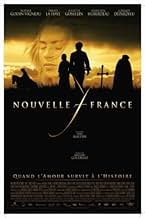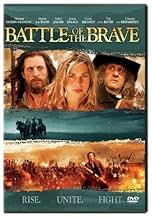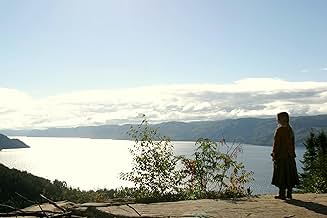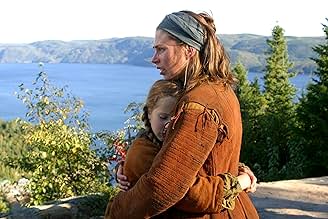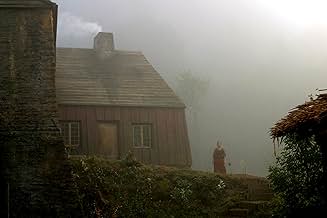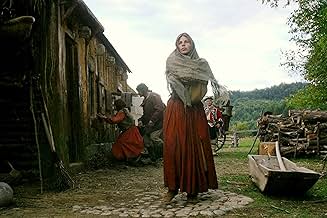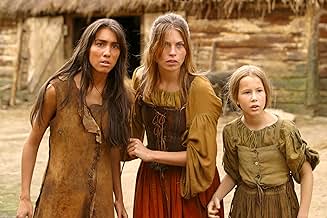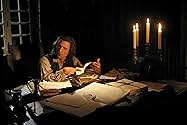NOTE IMDb
5,3/10
1,4 k
MA NOTE
Ajouter une intrigue dans votre langueIn the mid-18th Century, as England and France battle over control of Canada, an epic romance between a peasant woman and a trapper unfurls.In the mid-18th Century, as England and France battle over control of Canada, an epic romance between a peasant woman and a trapper unfurls.In the mid-18th Century, as England and France battle over control of Canada, an epic romance between a peasant woman and a trapper unfurls.
- Réalisation
- Scénario
- Casting principal
- Récompenses
- 2 victoires et 10 nominations au total
Johanne-Marie Tremblay
- Madeleine Carignan
- (as Johanne Marie Tremblay)
Billy Merasty
- Owashak
- (as William Merasty)
Avis à la une
To all those who lashed out at the film here: yes, the film gives sometimes the impression of being a bit pretentious, but whoever comes with such harsh criticism should also provide his own scale of values. So what is yours? What do you consider to be a really good film? OK, I understand, their should be 10 lines of text, and some egos need a place to show off, but frankly, who cares? The further one goes into details, scrutinizing it, the more looses the good impression that the film leaves
In these times, when the world is invaded by Avatars, even this sentimental film is an achievement.
dixi
In these times, when the world is invaded by Avatars, even this sentimental film is an achievement.
dixi
This is, literally, one of the most uselessly complex and "I-want-to-make-my-way-into-cinema-history" movie ever produced. I cannot think foreigners will see this movie and understand THAT as an accurate review of what happened to my country. I left the theater 38 minutes ago, and I am still shaking with anger.
First of all, cut the all-charm hero who's good at everything and the tough and revolutionary woman who dears go against armed guards by punching them in the face. I do not buy. I got nothing against Noémie Godin-Vigneault, she did a worthy job, but her character's flawed. Cut also the dull love story, absolutely unimaginative. The secondary characters, like Marie-Loup's father, like Voltaire and France Carignan, Marie-Loup's daughter. They deserve credit.
And finally, how dare did they destroy one of the finest North American piece of history by wanting to copy the "historical-moment-in-a-love-story" like Titanic and Pearl Harbor did. Historical values are not even respected. 4 years passed between the capitulation of Quebec and the Treaty of Paris. 4 years. Well, it seems nobody aged a day.
Please, before or after seeing this movie, ask for a French Canadian, for the REAL version of what happened. That way we can keep our dignity intact.
First of all, cut the all-charm hero who's good at everything and the tough and revolutionary woman who dears go against armed guards by punching them in the face. I do not buy. I got nothing against Noémie Godin-Vigneault, she did a worthy job, but her character's flawed. Cut also the dull love story, absolutely unimaginative. The secondary characters, like Marie-Loup's father, like Voltaire and France Carignan, Marie-Loup's daughter. They deserve credit.
And finally, how dare did they destroy one of the finest North American piece of history by wanting to copy the "historical-moment-in-a-love-story" like Titanic and Pearl Harbor did. Historical values are not even respected. 4 years passed between the capitulation of Quebec and the Treaty of Paris. 4 years. Well, it seems nobody aged a day.
Please, before or after seeing this movie, ask for a French Canadian, for the REAL version of what happened. That way we can keep our dignity intact.
This was supposed to be one big hit but the result is somehow nebulous . One big problem of this movie is the excessive emphasis on the tragic love story . The historic context is very nice and the war that is going on is just the background of what is happening with the main characters even if one of them is actively involved ( just a little, though ) in the political events . Even for those who might appreciate this tragedy, and believe me it's a real one, the movie will seems never-ending and slow-pace . The acting is pretty good ( the little girl is marvelous ! ) but too theatrical .
There was a battle going on in Quebec city but it was greatly reduced in the editing process . Some of the best scenes were just cut off as well . The photography was nice for that kind of movie and the visual research was very realistic and interesting .
It could have been better though...
There was a battle going on in Quebec city but it was greatly reduced in the editing process . Some of the best scenes were just cut off as well . The photography was nice for that kind of movie and the visual research was very realistic and interesting .
It could have been better though...
"Battle of the Brave" is a 2004 Canadian film originally titled "New France" since the story mainly takes place in Quebec during the closing years of France's control of the province and the French and Indian War circa 1759-63.
As other reviewers have pointed out, "Battle of the Brave" is not the most accurate title since it gives the impression that the film will focus on General James Wolfe victory over General Louis-Joseph de Montcalm on the Plains of Abraham outside Quebec City in late 1759. While this battle figures in as a brief backdrop it's not the focus. The focal point is a young peasant single mother, Marie-Loup, and her mutual passion for an aristocratic trapper, Francois. Francois seeks justice for the people of New France from the greedy and disloyal French overlords, but is ultimately forced to flee to France. A well-intentioned lie prevents Francois from taking Marie-Loup and her daughter with him, and this leads to tragedy.
As you can see, "Battle of the Brave" is more of a love story with a historical backdrop a la "Titanic" than a big battle picture like "Braveheart." As such, it may appeal more to women than men intent on seeing an action-oriented historical picture. Which isn't to say the movie's all romance; there's drama, comedy, history and flashes of action.
Actually, the title "Battle of the Brave" isn't all that inaccurate; it's just that the "battle" is on a much smaller scale than "Braveheart." The battle of the brave here is in the hearts of the main characters as they make hard and sacrificial choices during a time of great political upheaval. Unfortunately the DVD cover doesn't denote this; it suggests a big battle flick with huge armies along with the statement, "RISE. UNITE. FIGHT.", which is totally misleading. Why falsely market the product? Don't producers know bait-and-switch tactics will ultimately turn people off to the film?
I admit that the first time I saw "Battle of the Brave" I was somewhat disappointed because I was expecting something more along the lines of "Last of the Mohicans" (1992). Viewing it again recently, I was fully prepared for its uniqueness and even utilized the subtitles so I could keep track of the characters and not miss any of the accented dialogue, which I recommend. As a result, I quite enjoyed the movie. I was able to follow what was going on and successfully entered the world of the characters for the next couple hours (the film runs 143 minutes). Besides, who wants another "Last of the Mohicans"? We already have that. "Battle of the Brave" is totally unique and completely non-"blockbuster."
The film has high production values (it was the most expensive film ever made in Quebec) but it has a peculiar vibe that the viewer has to get used to; the tone is more akin to a TV movie (with a huge budget) than "Last of the Mohicans" or "Rob Roy," but I don't necessarily mean this in a negative sense.
With the exception of Gerard Depardieu, who plays Father Thomas, the main characters are relatively obscure French actors, but they all rise to the occasion. David La Haye as Francois is a likable and believable male protagonist. The actresses who play Marie-Loup, her daughter France, and their family friend Acoona are likewise great. I particularly appreciate Bianca Gervais as the part-native Acoona. Speaking of which, I like the respectable way the film figures in the Innu people, albeit small.
One reviewer lambasted the film as "seethingly anti-Catholic," but the ending totally refutes this absurd claim. Did he even finish the film? Actually the picture is brutally honest with its depiction of people, governments and institutions – all can be corrupted and corruption comes down to the individual. Just the same, honor and integrity are rooted in the individual before anything else. Governments and all institutions are only as good or bad as the individuals from which they're comprised. Thankfully, there's a remedy to corruption: humble repentance. Confession stops prosecution and humility attracts grace, which leads to positive change, even if it's upon one's deathbed.
The ending scene is powerful in a subtle way. No matter the tragedy, beauty and positivity can arise from the ashes.
Speaking of the ending, the credits sequence features the excellent song "Ma Nouvelle France" by Celine Dion, sung in French.
But the story leaves a few questions ***SPOILER ALERT***: Why did Father Thomas lie to Marie-Loup about Francois' letter? Was he simply concerned about her safety in a time of political unrest or did he love her so much he selfishly couldn't bear to have her removed from his life and influence? Why does France call Francois "Father" (capitalized) at the very end? Why didn't Marie-Loup simply tell the truth at the trial? After all, what legitimate court would convict an 11 year-old girl who was simply defending herself from a drunken rapist (unless, of course, the court was heavily biased toward Xavier)? ***END SPOILER***
The film was shot mainly in beautiful Quebec and Eastern Canada, which makes the film realistic. (Wouldn't it have been absurd to shoot it in, say, British Columbia, as was the case with "Pathfinder"?). (Speaking of which, "Pathfinder" is well worth checking out; it's a great 'guy flick'; the antithesis of "Battle of the Brave").
GRADE: B-
As other reviewers have pointed out, "Battle of the Brave" is not the most accurate title since it gives the impression that the film will focus on General James Wolfe victory over General Louis-Joseph de Montcalm on the Plains of Abraham outside Quebec City in late 1759. While this battle figures in as a brief backdrop it's not the focus. The focal point is a young peasant single mother, Marie-Loup, and her mutual passion for an aristocratic trapper, Francois. Francois seeks justice for the people of New France from the greedy and disloyal French overlords, but is ultimately forced to flee to France. A well-intentioned lie prevents Francois from taking Marie-Loup and her daughter with him, and this leads to tragedy.
As you can see, "Battle of the Brave" is more of a love story with a historical backdrop a la "Titanic" than a big battle picture like "Braveheart." As such, it may appeal more to women than men intent on seeing an action-oriented historical picture. Which isn't to say the movie's all romance; there's drama, comedy, history and flashes of action.
Actually, the title "Battle of the Brave" isn't all that inaccurate; it's just that the "battle" is on a much smaller scale than "Braveheart." The battle of the brave here is in the hearts of the main characters as they make hard and sacrificial choices during a time of great political upheaval. Unfortunately the DVD cover doesn't denote this; it suggests a big battle flick with huge armies along with the statement, "RISE. UNITE. FIGHT.", which is totally misleading. Why falsely market the product? Don't producers know bait-and-switch tactics will ultimately turn people off to the film?
I admit that the first time I saw "Battle of the Brave" I was somewhat disappointed because I was expecting something more along the lines of "Last of the Mohicans" (1992). Viewing it again recently, I was fully prepared for its uniqueness and even utilized the subtitles so I could keep track of the characters and not miss any of the accented dialogue, which I recommend. As a result, I quite enjoyed the movie. I was able to follow what was going on and successfully entered the world of the characters for the next couple hours (the film runs 143 minutes). Besides, who wants another "Last of the Mohicans"? We already have that. "Battle of the Brave" is totally unique and completely non-"blockbuster."
The film has high production values (it was the most expensive film ever made in Quebec) but it has a peculiar vibe that the viewer has to get used to; the tone is more akin to a TV movie (with a huge budget) than "Last of the Mohicans" or "Rob Roy," but I don't necessarily mean this in a negative sense.
With the exception of Gerard Depardieu, who plays Father Thomas, the main characters are relatively obscure French actors, but they all rise to the occasion. David La Haye as Francois is a likable and believable male protagonist. The actresses who play Marie-Loup, her daughter France, and their family friend Acoona are likewise great. I particularly appreciate Bianca Gervais as the part-native Acoona. Speaking of which, I like the respectable way the film figures in the Innu people, albeit small.
One reviewer lambasted the film as "seethingly anti-Catholic," but the ending totally refutes this absurd claim. Did he even finish the film? Actually the picture is brutally honest with its depiction of people, governments and institutions – all can be corrupted and corruption comes down to the individual. Just the same, honor and integrity are rooted in the individual before anything else. Governments and all institutions are only as good or bad as the individuals from which they're comprised. Thankfully, there's a remedy to corruption: humble repentance. Confession stops prosecution and humility attracts grace, which leads to positive change, even if it's upon one's deathbed.
The ending scene is powerful in a subtle way. No matter the tragedy, beauty and positivity can arise from the ashes.
Speaking of the ending, the credits sequence features the excellent song "Ma Nouvelle France" by Celine Dion, sung in French.
But the story leaves a few questions ***SPOILER ALERT***: Why did Father Thomas lie to Marie-Loup about Francois' letter? Was he simply concerned about her safety in a time of political unrest or did he love her so much he selfishly couldn't bear to have her removed from his life and influence? Why does France call Francois "Father" (capitalized) at the very end? Why didn't Marie-Loup simply tell the truth at the trial? After all, what legitimate court would convict an 11 year-old girl who was simply defending herself from a drunken rapist (unless, of course, the court was heavily biased toward Xavier)? ***END SPOILER***
The film was shot mainly in beautiful Quebec and Eastern Canada, which makes the film realistic. (Wouldn't it have been absurd to shoot it in, say, British Columbia, as was the case with "Pathfinder"?). (Speaking of which, "Pathfinder" is well worth checking out; it's a great 'guy flick'; the antithesis of "Battle of the Brave").
GRADE: B-
Ultimately, this movie is a Brazilian soap opera. There are intrigues and billets-doux. The pop theme, recorded by an orchestra in Prague, is good but over-used. At least seven or eight crescendos cover various characters when they either grasp each other, look at each other or wistfully stare out windows while thinking of each other.
I didn't mind the historical and geographical inaccuracies. The need for financing seems to have motivated scenes of Pitt and Voltaire. (Was the inclusion of Franklin a failed attempt at American financing?) In fact, these scenes were not necessary since the movie used symbolism. The basic facts arguably fit the presentation. A case can be made that New France was abandoned by France, abused by the Catholic Church and strung up by England. Marie-Loup, get it? In the movie, she is illiterate but very articulate. Indeed, everyone spoke with modern international accents from mouths with white straight teeth. (So what! It's only a movie!)
Jean Beaudin made "J. A. Martin Photographe" which was both a beautiful and sensitive movie with Monique Mercure in the lead. She's in this one too but her presence only hearkens to the past. Despite its flaws, I enjoyed "Nouvelle France" but I'd probably enjoy any movie about the history of northern North America. If you have no interest in such history, this movie will be a convoluted Brazilian soap opera.
I didn't mind the historical and geographical inaccuracies. The need for financing seems to have motivated scenes of Pitt and Voltaire. (Was the inclusion of Franklin a failed attempt at American financing?) In fact, these scenes were not necessary since the movie used symbolism. The basic facts arguably fit the presentation. A case can be made that New France was abandoned by France, abused by the Catholic Church and strung up by England. Marie-Loup, get it? In the movie, she is illiterate but very articulate. Indeed, everyone spoke with modern international accents from mouths with white straight teeth. (So what! It's only a movie!)
Jean Beaudin made "J. A. Martin Photographe" which was both a beautiful and sensitive movie with Monique Mercure in the lead. She's in this one too but her presence only hearkens to the past. Despite its flaws, I enjoyed "Nouvelle France" but I'd probably enjoy any movie about the history of northern North America. If you have no interest in such history, this movie will be a convoluted Brazilian soap opera.
Le saviez-vous
- AnecdotesTwo versions of the film were shot simultaneously, an English language version titled 'Battle of the Brave' and a French language version titled 'Nouvelle-France'.
- GaffesThere was no such word as Canadian in 1752. It originates from the word kanata in the Iroquois language. The region was known as New France.
- Citations
François le Gardeur: Courage goes hand in hand with fear.
- Versions alternativesTwo versions of the film were shot simultaneously, an English language version titled 'Battle of the Brave' and a French language version titled 'Nouvelle-France'.
- ConnexionsFeatured in Céline Dion: Ma Nouvelle-France (2004)
Meilleurs choix
Connectez-vous pour évaluer et suivre la liste de favoris afin de recevoir des recommandations personnalisées
- How long is Battle of the Brave?Alimenté par Alexa
Détails
- Date de sortie
- Pays d’origine
- Site officiel
- Langues
- Aussi connu sous le nom de
- Battle of the Brave
- Lieux de tournage
- Sociétés de production
- Voir plus de crédits d'entreprise sur IMDbPro
Box-office
- Budget
- 27 000 000 $CA (estimé)
- Montant brut aux États-Unis et au Canada
- 1 599 716 $US
- Week-end de sortie aux États-Unis et au Canada
- 468 625 $US
- 21 nov. 2004
- Montant brut mondial
- 2 058 007 $US
- Durée2 heures 23 minutes
- Couleur
- Mixage
- Rapport de forme
- 1.85 : 1
Contribuer à cette page
Suggérer une modification ou ajouter du contenu manquant

Lacune principale
By what name was Nouvelle-France (2004) officially released in Canada in English?
Répondre

